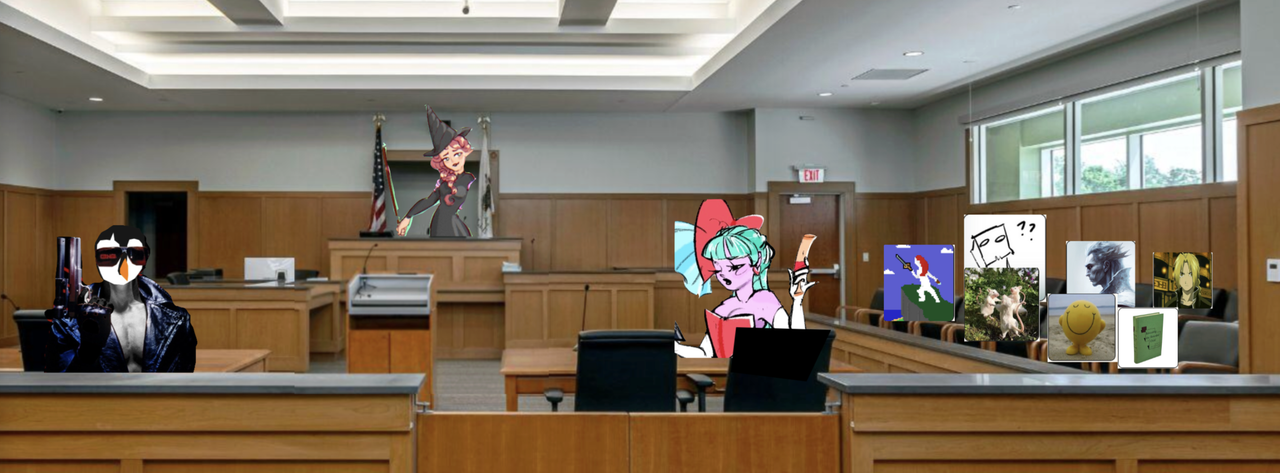Gryphon, The Expert Scrivener
Member Since
Last Activity
EXP Points
Post Count
Storygame Count
Duel Stats
Order
Commendations
Shut the fuck up Gryphon --Malk
Gryphon is a no life having bitch --Thara
Who among us does not love Gryphon --Sent
You've gained a reputation, Gryphon, no one wants to walk through tech support with you --Mizal
Gryphon put a lot of skill points into productivity but none into technological proficiency --Sherbert
I liked all of Gryphon's reviews, he was very thorough --EndMaster
Never did I think I'd see the day when I was forced to accept a they/them in my virtual fiefdom, but the sneaky bastard tricked us with a featured game and all those reviews and with being so likeable and nice and so now here we are. --Mizal
CLARIFICATION: A lot of people seem to think I use they/them; not sure how that got spread around but it's always been just he/him lol
You can see all my reviews at once here: Gryphon's Review Archive And my demo explaining how to make an image-based point and click game in the CYS editor here: Point and ClickTrophies Earned











Storygames
=For End Master's Manifest Destiny contest=
When Alexsis starts trying to steal your favorite seat in the school cafeteria, things get serious. The pair of you decide to resolve this dispute in combat: a game of capture the flag. Can you beat your nemesis in a game of capture the flag, and reclaim what is rightfully yours?
This story is a short cave-of-time style game with seven possible victory endings. Happy flag-hunting!
As humanity begins to leave their corner of the galaxy for the first time, they encounter previously uncontacted alien races. As one of earth's leading diplomats, you will play a key role in shaping the future of your species in this unfamiliar world.
A mostly cave-of-time style story with limited rebranching in a few places, and five victory endings.
Winner of End Master's Culture Clash Contest
In this short RPG game, you explore your local village, solving challenges and puzzles, as you try to decide what to do in your future career.
When a thunderbird attacks you while you search for the missing Professor Keirz, you crash-land on a plateau near the legendary ruins of a ruined Anzaran city. You must make use of the resources around you to repair your damaged flyer, find your missing friend, and unlock the secrets of the ancient Anzaran temple.
An open-map item-based puzzle game with one good victory ending, and one great victory ending. Good luck exploring the ancient Anzaran plateau!
Discover the dungeon's secrets, fight deadly monsters, learn magical spells, and more in this traditional dungeon crawl adventure! Can you survive the dangers of the legendary Crag?
An open-map dungeon exploration game using player stats and items, with eleven victory epilogues, as indicated by the first two digits of your score.
Thanks to Nightwatch for the fantastic cover art!
An unexpected supernatural disaster leaves you and your your younger cousins adrift in a strange sea full of mythical creatures and beings. Can you and your cousins escape, or will you succumb to the deadly sea?
Currently, this is a short cave-of-time style game with three victory endings. It is complete in its current form, consisting of the first of many planned "episodes" for the game. It will eventually be expanded into an episodic gauntlet-style game.
Your score indicates which ending you reached. 0 for a death ending, and a score of 1, 2, or 3 corresponds to one the game's victory endings.
Click on the treasure pile when you reach the end of the demo, and it will take you to an explanation on how to code one of these games, and a copy of all the code used to build this one.
To use an item in your inventory, click on it to select. You'll know it is selected because it turns grey. Then you can 'use' it by clicking on the area you intend to use it on.
Articles Written
A Guide to Character Creation for StorygamesCoding Item-Based Battle Sequences
Creating an Equipping System
Recent Posts
The Review Club on 2/17/2026 7:14:46 PM(If you don't mind a few questions there were some things I wondered while reading--A) What was the original idea behind this game? B) Which path did you write first? C) Where on earth is that skinwalker ending?? No pressure to any of these.)
The Review Club on 2/17/2026 11:30:46 AM
Chicken Huntin' on 2/14/2026 11:52:57 AM
By the same token, on a couple occasions, after enough time has passed, banned site members who didn't engage in long-term sockpuppetry have been allowed to return to the site. This is getting less and less possble for you the more bridges you burn, and at this stage may already be too late.
Cock-a-Doodle Doofus on 2/7/2026 8:59:22 PM
In case you somehow missed it, here's the site policy on AI. It's in the pinned thread at the top of Newbie Central: LINK
Using AI to 'enhance' your writing is still using AI. If you had another human being redo your wording, it would be co-authoring. When you have an AI do it, you are co-authoring with AI. At minimum you have an obligation to disclose that instead of claiming it is your own. Since AI is banned on CYS, this behavior is banned on CYS. But you know that already, or you wouldn't have bothered to lie by omission about it.
So here's what happens now:
- You get clowned on in the forums. This is CYS, so that was going to happen anyways; but:
- You didn't write this story, so the feedback you would have received (both from the clowning & more polite commends) is utterly worthless.
- You have taught the people who would normally read & review your story that you have no use for feedback. People give feedback on this site because they want to help fellow writers grow their ability. By using AI to do the work for you, you are saying you have no interest in becoming better at the work yourself. So no one has any reason to engage with your work.
- Moreover, because you deliberately told a lie of omission (twice) in trying to pass off an AI-coauthored story as your own, you have taught the community that you do not respect them, or their time. People will assume the things you write and post are AI even if you say otherwise, and choose not to engage with them. They will assume you will waste their time, so they will not engage with you. (Except, again, to clown on you in the forums.)
It is possible for you to come back from this and rebuild your credibility. The odds are against you, but it's possible if you're committed. My hope for this post is to be clear why AI use is so unwelcome in writing communities (leaving aside all the other problems & complexities with AI use).
Cock-a-Doodle Doofus on 2/4/2026 9:19:15 AM
First off if you're considering embarking on a long project I strongly recommend Mystic's Guide to Writing Epic Storygames. Tons of fantastic advice in here.
Here's the main things that concerns me about your idea:
1) You have a big idea that requires a long game, but you don't seem enthusiastic about all the material you'd need to come up with to fill it. You like the idea of an epic scale 4th-wall breaking confrontation that involves both character and reader. But I'm not getting the sense that you're at all excited about the biblical sub-stories you'll have to write to support this, when those are A) the chief focus of your prompt, and B) the actual meat of the story. No matter how epic the building hidden background plot is, this game will not work if passion and craft isn't invested into making the foreground plot genuinely compelling in its own right.
2) There are inherent limits to a 4th wall breaking story. They can be very good, but you can only 'involve' the reader so much before they remember they're reading a fictional story and no eldritch monster from it can ever enter our reality. The best 4th wall breaking stories are the ones that work with that limitation (or at least reasonably cover it up) rather than asking the reader to conveniently forget about it.
3) It's concerning that you're asking for input from others about broad topics like branch structure, variable decisions, and the overall direction of the story. Either A) You're seeking very basic advice on how branch structure/variables/storytelling plots work, in which case you haven't put in the requisite work to build a complex game like this anyways, or B) You know your options, but don't actually care enough about your idea to have strong feelings about how you implement it or where you take your story.
If it's option A, the good news is we have articles on this stuff: This article has a link to an article that explains the major types of branching narratives, and the help & info section has a lot of articles that can give you an idea of what you can do with variables. You can explore these resources and figure out how you want to use mechanics to enhance your storytelling. But it's not likely that you'll be able to implement this at the scale you want to, on your first try, within the span of the contest.
If it's option B that's less fixable--it sounds like you just don't care much about your idea, and you'd be better off picking something you DO have strong opinions about than asking other people to fill in the gaps. Ultimately you are the one who will have to write your story, and it will only happen if you yourself are passionate about every writing decision you make.
EDIT: Just say your response to Clayfinger. It's true that playing it safe doesn't promote growth. But over-reaching doesn't either, it just leads to collapse and burnout. There's a sweet spot in the middle where you're pushing yourself just past your previous limitations where the most growth happens. In your case, if you've never written a storygame before, just getting one finished is the limit you're pushing. You'll learn and grow plenty by picking a small idea and putting in the work to do it justice.
CYS HOT TAKES on 1/24/2026 6:25:53 PM
Heir to the Empire on 1/22/2026 9:04:09 AM
The Review Club on 1/19/2026 7:29:04 AM
CYS HOT TAKES on 1/18/2026 3:20:13 PM
CYS v S. Penguin on 1/14/2026 9:55:10 PM
 Always heartening to see the CYStian justice system doing its job. Perhaps as volunteer court sternographer I can receive some compensation from the defendant's estate sale?
Always heartening to see the CYStian justice system doing its job. Perhaps as volunteer court sternographer I can receive some compensation from the defendant's estate sale?

